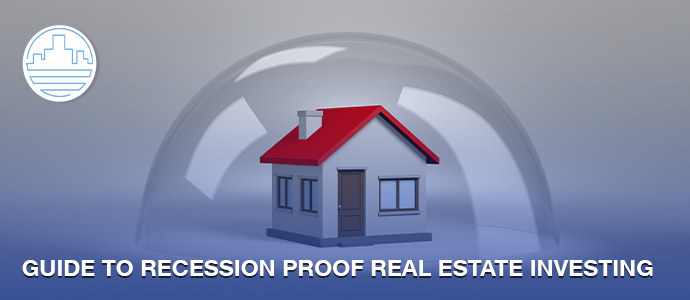
There are several talks of a recession doing the rounds; many experts are saying that we are already in the storm of things. In such a scenario, you likely have a lot of concerns as a real estate investor. You probably also have a lot of questions like how to capitalize in a recession or how you can recession-proof your real estate investments.
In this blog, we’ll be exploring the best tips to recession-proof your real estate investments, along with giving you our expert recommendations on what to invest in during a recession.
Real Estate Market During A Recession
The National Bureau of Economic Research (NBER) defines recession as “a period where there is significant decline in economic activity that is spread across the economy and lasts more than a few months.” Recessions do have substantial consequences on the housing market and real estate investments – when the economy is not doing well, it might lead to fewer people having enough money to buy houses. Thus, with higher supply, and lower demand, properties might stay on the market for a very long time leading to a fall in their values. Also, due to less money, if people can’t pay their loans, the rate of mortgage foreclosures and delinquencies might increase. So, how to build a real estate portfolio in such testing times? By investing in types of properties that yield profits, no matter the scenario.
Best Investments During Recession
Off-Campus Student Housing
Regardless of a recession, students will keep going to colleges and universities. As a result, they will keep looking for rental properties on and off- campus. This is where an investment in off-campus student housing will pay off.
Multifamily Real Estate
One of the best recession investments is a multifamily property, despite the fact that during a recession, the property’s value might not appreciate, and the rent might grow at snail’s pace. The fact remains that even if a few units from the property remain vacant, you’ll still have a steady flow of income during economic turbulence.
Senior Housing
The United States has a huge aging population. So, senior housing is constantly in demand, thus making it a recession proof investment.
Farmland
Farmlands are pretty much recession-proof. No matter what the economic situation, food will always remain a necessary staple. Since food is a need, not a want, a farmland keeps yielding income all throughout the year.
5 Tips For Recession Proof Investments
There’s no way to avoid a recession, that’s for sure. But, as a professional investor, you shouldn’t let it stop you from growing your portfolio. These 5 tips will help you build recession proof investments:
Tip 1: Maximize your cash flow
In an economically unstable environment, it is important to have a steady cash flow. This can be done by:
- Increasing the rent
- Allowing pets for an extra fee
- Providing additional services like coin-operated laundry machines etc.
- Getting routine maintenance done in order to avoid future repairs
Tip 2: Factor in Risk and Yield
During a recession, banks generally relax their lending requirements and usually extend credit at extremely low rates. But this could not always work in your favor. A savvy investor will know to consider the risk and yield before opting for a credit. Keeping your debts low is the best way to go.
Tip 3: Reduce Debts
Before investing in a recession, focus more on reducing your debts. Since banks lower the interest rates during such times, seize this opportunity with both hands and pay off as much of your loan as you can.
Tip 4: Diversify
One way to recession-proof your portfolio is to diversify your assets. This can be done by:
- Investing in a Real Estate Investment Trust (REIT)
- Buying Treasury Inflation-Protected Securities (TIPS)
- Participating in a private equity investment fund
- Diversifying across asset classes
Tip 5: Increase Liquidity
As previously mentioned, reducing your debt is a good way to recession-proof your investments. What goes hand-in-hand with reducing debts is increasing your liquidity. Unlike other investments, you cannot buy or sell real estate properties quickly. So, offloading underperforming assets in order to increase your liquidity is the way ahead during a recession.
Grow Your Investment Portfolio With BFPM
Very few investors can actually predict the dynamic market conditions with any real accuracy. This is where we can help you. The property experts at Beach Front Property Management can help you optimize your income, and minimize the risks, even in volatile market and economic conditions. To know more, you can schedule a 15- minute consultation call with us. We’ll be happy to help you.
Learn more about how we can help. Customized solutions for large portfolios!
